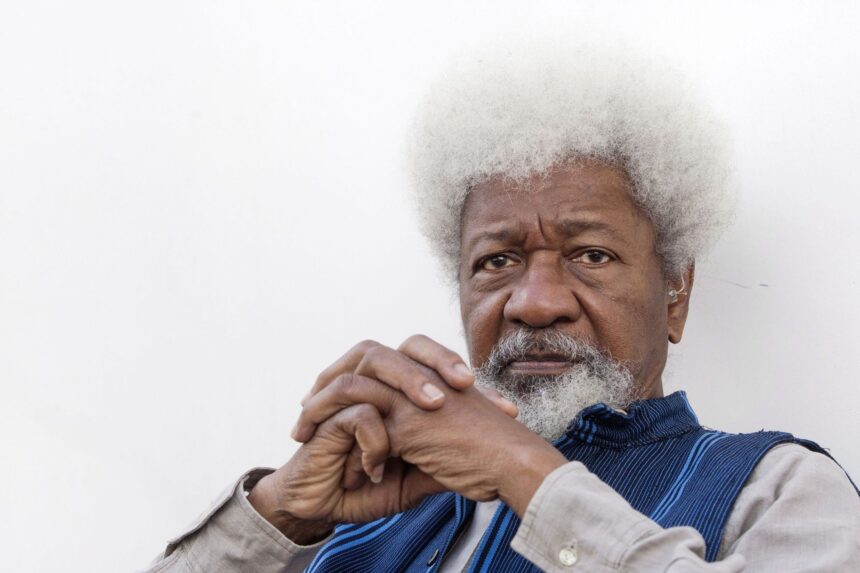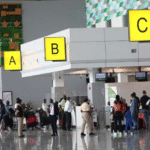Nobel Laureate Professor Wole Soyinka has revealed details of how the United States (U.S) revoked his visa, citing “additional information” that surfaced after its issuance.
Soyinka revealed how the U.S revoked his visa while reading a formal letter from the U.S. Consulate General in Lagos State.
The 91-year-old icon, known for his critique, read the letter during an event, themed “Unending Saga: Idi Amin In Whiteface!” at Kongi’s Harvest Gallery in Freedom Park, Lagos.
Soyinka, who famously tore up his U.S. Green Card in 2017 amid his vocal opposition to then-President Donald Trump’s policies, framed the revocation not as a personal affront.
Soyinka added that he was unaware of any wrongdoing that led the U.S to revoke his visa.
“It is necessary for me to hold this conference so that people in the United States who are expecting me for this event or that event do not waste their time.
“I have no visa; I am banned, obviously, from the United States. And if you want to see me, you know where to find me,” he told journalists.
According to Soyinka, the U.S Consulate informed him of the revocation in a letter dated October 23, 2025.
“This letter serves as official notification by the United States Consulate General in Lagos that the nonimmigrant visa listed below has been revoked pursuant to the authority contained in U.S. Department of State regulations,” part of the letter, shown to the press by Soyinka, read.
The letter was issued by the NIV Section of the Consulate.
The Nobel Laureate expressed confusion over the development, saying, “I’m still looking into my history… I don’t have any past criminal record or even a felony or misdemeanor to qualify for the revocation.
“I’ve started looking back—have I ever misbehaved toward the United States of America? Do I have a history? Have I been convicted? Have I gone against the law anywhere?”
Soyinka, during his speech, also recalled his two incidents with U.S authorities at the airport.
While describing the two incidents as misunderstandings, Soyinka maintained that they did not amount to criminal activity.
The first incident, he said, occurred many years ago at an American airport.
Upon arrival in the U.S., airport officials discovered the pepper during a routine search and fined him 25 dollars for bringing agricultural produce into the country without declaration.
“The officials were just doing their job,” he said, laughing. “It was a harmless mistake I simply forgot to declare the chilli I had carried from London.”
The second incident, Soyinka said took place in the 1970s at Chicago Airport, where he said he challenged an immigration officer who made a racist remark.
Reflecting on both experiences, Soyinka said, “I do not think those two incidents are enough to classify me as having a criminal record in the United States. They were simply misunderstandings that could happen to anyone.”
Pan-Atlantic Kompass reports that Soyinka revealed how the U.S revoked his visa after he declined an invitation by the US Consulate in Nigeria for a visa re-interview, which was scheduled for Thursday, September 11, 2025.
Soyinka had revealed during an interview with the press that the American Consulate sent a message to Nigerians about a visa re-interview for his B1/B2 visas.
Soyinka’s visa is classified as B1/B2—a temporary, non-immigrant visa for travel to the United States for business (B-1) or tourism (B-2).
Speaking during the interview, Soyinka stated then: “I would like to begin by stressing the fact that, for me, this is not a personal issue. I have no idea how you got to know. By the way, I also received the letter, which at first I thought was fake. I thought it came from scammers who prey on those eager to get visas elsewhere, promising to deliver them for a certain amount. I thought they had simply picked my name among others, knowing there was a list of invitees.
“So, at first, I thought it was advance-fee fraud because I had never received that kind of letter from that or any other embassy. I even thought that maybe AI had been generating generic letters. It was very strange.
“So, by the time I came to terms with the fact that the letter was genuine, my mind went to my relationship with individual ambassadors, Consuls General, and Cultural Attachés. As you know, it has always been a courteous relationship.”
Meanwhile, Nigerians have begun to react after Soyinka revealed that the U.S revoked his visa.
Prof. Sandra C Duru, a political commentator said: “The United States of America was right, fully right, to revoke Professor Wole Soyinka’s visa if indeed he once tore his American green card. That act was not a symbol of protest. It was a public declaration of contempt.
“You cannot tear up a nation’s symbol of trust and privilege and then expect to walk back into that same nation with entitlement. The American visa is not a souvenir. It’s a covenant of respect between the bearer and the State.
“When Professor Soyinka ripped his green card in 2016 to protest America’s political direction, he was not just rejecting an administration. He was rejecting the sovereignty of the United States itself. Every lawful government acts to defend its dignity, its borders, and its symbols of authority. To revoke his visa is not petty. It is a principle. It is America saying, you cannot mock our values and still demand our hospitality.”
However, a human rights activist and publisher of Sahara Reporters, Omoyele Sowore, has expressed disappointment after Soyinka revealed that the U.S revoked his visa.
Sowore, in a post on his Facebook page on Tuesday, condemned the development.
He wrote: “Donald Trump reportedly revoked the U.S. visa of Nobel Laureate Wole Soyinka! Sad! What the U.S. has become!”
Below are some other reactions from social media;





